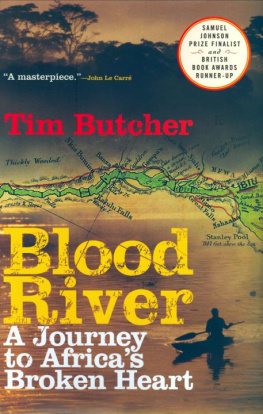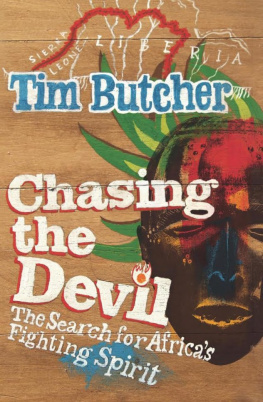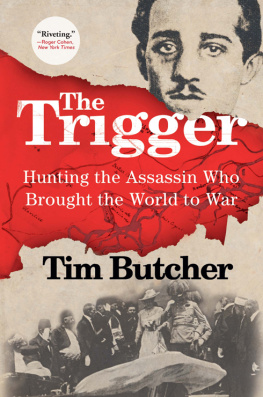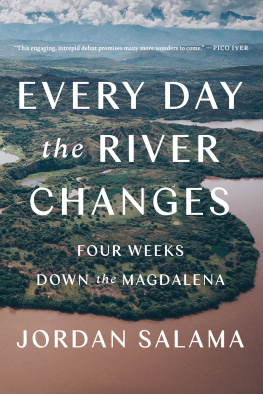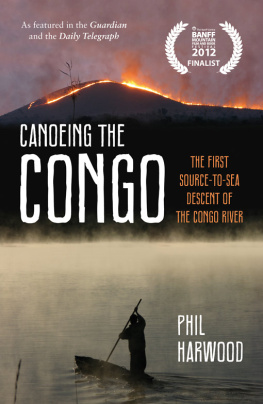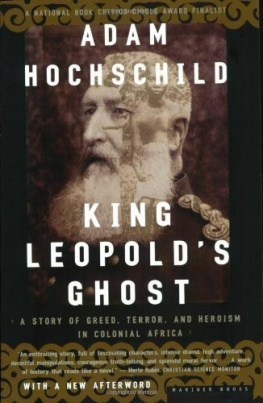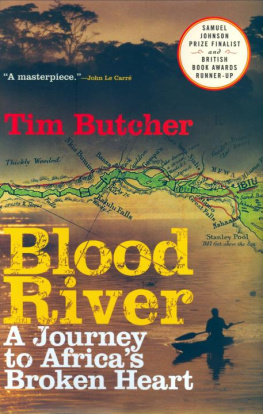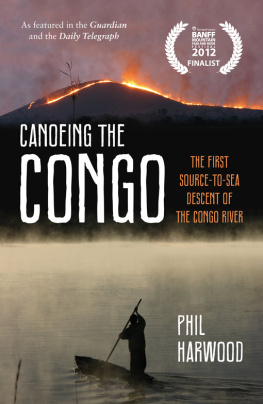




For Jane
Contents
xi
1 1
Preface
I stirred in the pre-dawn chill, my legs pedalling for bedclothes kicked away earlier when the tropical night was at its clammiest. I could hear African voices singing to a drum beat coming from somewhere outside the room, but my view was fogged by the mosquito net, and all I could make out around me were formless shadows. Slowly and carefully, so as to not to anger them, I reached for the sheet balled next to my knees. It stank of old me and insect-repellent as I drew it over my shoulders. I was not just looking for warmth. I wanted protection. Outside was the Congo and I was terrified.
On the grubby floor next to the bed, my kit lay ready in the dark. There were my boots with their clunky tread and sandy suede uppers. Two thousand dollars were hidden in each, counted carefully the day before, folded into plastic bags and tucked under the insoles. There was my rucksack, packed and repacked several more times for reassurance with my single change of clothes, a heavy fleece, survival bag and eight bottles of filtered water. Explorers who first took on the Congo in the nineteenth century brought with them small armies bearing the latest European firearms and the best available medicines to protect against ebola, leprosy, smallpox and other fatal endemic diseases. The only protection I carried was a penknife and a packet of baby-wipes.
I was in a large town called Kalemie, but all was dark outside. It lies on the Congo's eastern approaches, a port city on the edge of Lake Tanganyika, once connected by boat with Tanzania, Zambia and the world beyond. Forty years of decay have turned it into a disease-ridden ruin and its decrepit hydroelectric station could barely muster a flicker. As with the rest of this huge country, the locals in Kalemie have long since learned to regard electrical power as a rare blessing, not a permanent right.
Now too anxious to sleep, I got up and dressed, taking special care not to ruck the dollars as I slipped on my boots. The charcoal burner, used to warm the gluey brick of rice I had eaten the previous night, glowed as I unlocked the double padlock on the back door and pushed open the crudely-welded security gate. I was staying in a bleak building, cloudy with mosquitoes and lacking running water, but the fact that it housed an American aid group made it a target in a country where acute poverty makes lawlessness routine. Against the lightening sky in the east I could make out a crude line of jagged bottle fragments cemented to the top of the high perimeter wall.
'Is anyone there?' My voice set off a dog barking outside the compound. The night watchman stepped out smartly from shadows.
'Present, patron.' The tone of his reply made him sound like a soldier answering roll call: subservient, militaristic and deferen tial. It was the tone of the Congo, drilled into its people first by gun-wielding white outsiders and then by cruel local militia.
As I checked over the motorbikes I had lined up for my journey, I could feel that the guard was anxious to reassure me. `Don't worry, patron, everything is okay' he told my arched back as I bent over a rear wheel. 'I was awake all night long and nobody came over the wall.' He was a trained teacher, but the collapse of the Congolese state meant there was no money in teaching. The $30 he earned for a month of nights spent swatting mosquitoes in this compound was enough to keep him from his pupils.
The eastern sky was slowly growing more pale, but I turned to face west. Out there the darkness remained absolute. I felt a presence. Between me and the Atlantic Ocean lay a primeval riot of jungle, river, plain and mountain stretching for thousands of kilometres. For years I had stared at maps dominated by the Congo River, a silver-bladed sickle, its handle anchored on the coast, its tip buried deep in the equatorial forest, but now I could feel its looming sense of vastness. It scared me.
I have come to know well my own symptoms of fear. In ten years as a war correspondent I have crossed enough active frontlines and stared at enough airily-waved gun barrels to recognise how my subconscious reacts. For me terror manifests itself through clear physical symptoms, an ache that grows behind my knees and a choking dryness in my throat.
I had spent three years preparing for this moment, planning and researching, and it had already taken a week of delays and hassle just to reach this spot, but the most dangerous part of my journey was only now beginning. Feeling as if my legs were about to collapse, I croaked a faint curse against the obsession that had drawn me to the most daunting, backward country on Earth.
I fingered a piece of paper folded in my pocket. It was a travel pass bearing the smudgy ink stamps of the local district commissioner, granting permission for `Butcher, Timothi' to make a journey overland to the Congo River 500 kilometres away. It spelled out the modes of transport authorised for the trip: bicycle, motorbike and dugout canoe. To reach the river I would have to travel west, crossing Katanga, a province that has been in a state of near-permanent rebellion for more than forty years, and Maniema, a province where cannibalism remains as real today as it was in the nineteenth century, when bearer parties refused to take explorers there for fear of being eaten. Even if I made it to the river, I would still have 2,500 kilometres of descent before reaching my final goal, close to where the Congo River spews into the Atlantic.
I remembered the reaction of the commissioner's secretary in Kalemie when I had collected the pass a few days earlier. After reading my itinerary he stopped writing, put his pen down very deliberately and raised his head to look at me. The lenses of his thick-framed glasses were misty with scratches, but I could still see his pupils pulse with disbelief.
'You want to go where?'
'I want to go to the Congo River.'
`You want to go overland?'
`Yes.'
`My family comes from a village on the way to the river, but we have not been able to go there for more than ten years. How do you think you will get there?T
'With a motorbike and some luck.'
`You are a white man, you will need something more than luck.'
Shaking his head slowly, his gaze dropped back to the travel pass, which he stamped with the seal of office of the District Commissioner for North Katanga. As I turned to leave I looked round the office. It had a crack in one wall so wide I could see blue sky through it, an old Bakelite telephone connected to nothing, and a tatty air that spoke of regular bouts of looting.

